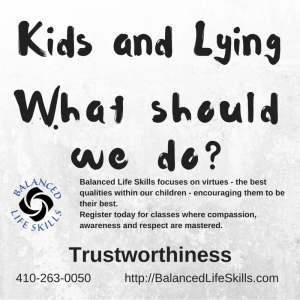 The moment that is most shocking to most parents is the first time that their child – who has been so good up to this moment – tells them an untruth. When it happens a second, third or more times, we begin to question ourselves and wonder how this could happen. “We ask, Is my child trustworthy, Will I ever be able to trust them again?”
The moment that is most shocking to most parents is the first time that their child – who has been so good up to this moment – tells them an untruth. When it happens a second, third or more times, we begin to question ourselves and wonder how this could happen. “We ask, Is my child trustworthy, Will I ever be able to trust them again?”
I begin with the belief that every child is trustworthy, that they have that virtue in them. They are worthy of our trust in them to do and be honest with us, to keep their promises. So what happens that this wonderful child out of the clear blue sky, decide to tell us a lie?
First remember they are still a wonderful child. Second they will tell you that they lied because of one of two things.
- they didn’t think it was that big a deal or,
- they didn’t want to get in trouble.
Either way what they are saying to us is that what the family values (the behavior they are lying about and the value of honesty / trustworthiness) is not as important to them at this moment as their personal value of the behavior or of not getting into trouble. It is very easy for them to rationalize a behavior and justify their actions if they think that it is OK for them / not hurting others.
While we as a parent feel pain, anger and personally hurt, we want to be very careful about going down the road of “blame and shame”, of looking at our child as a bad person or worse “a liar”. Remember our children have a fear of not wanting to get in trouble and a fear of disappointing their parents. With fear comes one of two reactions – fighting or fleeing. Both of those choices begin to look like lying may fill the need for them.
With the need to redirect our child we want to look at this as a teachable moment, vs. just a personal affront. In fact if we remember that the child may very well just not want to disappoint us, just that thought will make our discipline come from a place of love vs. fear. Try these steps;
- Use a time out constructively
- Ask them to consider the virtue they need to practice
- Give consequences when it is called for
- Provide the opportunity to make amends
- Notice and name the virtue when you see them being practiced
Our goal is to build their character by building a healthy conscious. As we show our children in teachable moments how lying affects others, how the behavior they chose may hurt themselves and others, we are using our skills and example to empower them rather than demoralize. Above all else, look for and recognize your child when they are practicing the values of your family.



